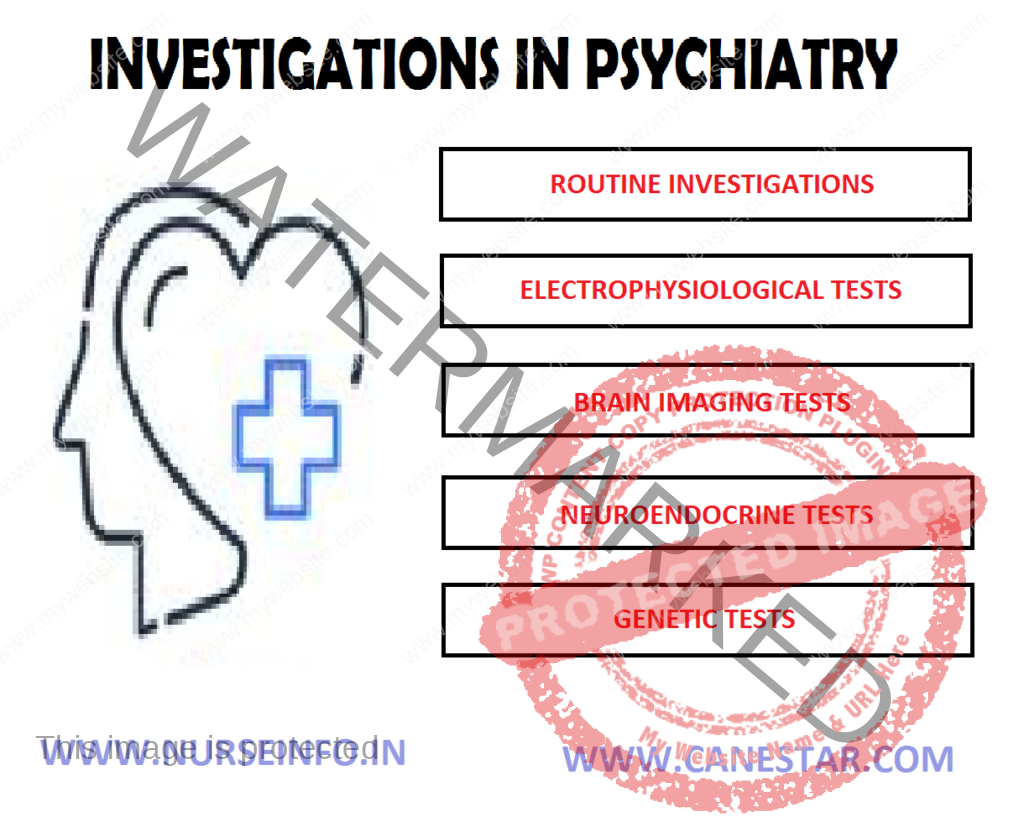INVESTIGATIONS IN PSYCHIATRY
Investigations are useful to detect alteration in biologic function and to screen for medical disorders causing psychiatric symptoms.
Routine Investigations
- A complete hemogram (total and differential blood count, hemoglobin, ESR) and urinalysis are the basic routine tests. Leucopenia and agranulocytosis are associated with certain medications (Clozapine). Treatment with lithium and neuroleptic malignant syndrome are often associated with leukocytosis.
- Renal function tests: Treatment with lithium
- Liver function tests: For all alcoholic patients treatment with carbamazepine, valproate and benzodiazepines
- Serum electrolytes: Dehydration, treatment with carbamazepine, antipsychotics, lithium
- Blood glucose: Routine screen above 35 years age
- Thyroid function test: Depression, treatment with lithium and carbamazepine
- Electrocardiogram (ECG): Above 35 years of age, treatment with lithium, antidepressants, ECT, antipsychotics
- HIV testing: IV drug users suggestive sexual history, AIDS, dementia
- VDRL: Suggestive sexual history
- Serum CPK: Neuroleptic malignant syndrome (markedly increased levels)
- Chest X-ray: Before treatment with ECT
- Drug level estimation: Drug levels are indicated to test for therapeutic blood levels, for toxic blood levels and for testing drug compliance. Examples are lithium (0.6 – 1.6 mEq/L), carbamazepine (6-12 mg/mL), valproate (50-100 mg/mL), haloperidol (8-18 ng/mL), tricyclic antidepressants (Imipramine 200-250 ng/mL, nortriptyline 50-150 ng/mL), benzodiazepines, barbiturates.
Electrophysiological Tests
Electroencephalogram (EEG): Measures brain electrical activity, identifies dysrhythmias and asymmetries, used in the diagnosis of seizures, dementia, neoplasm, stroke, metabolic or degenerative disease.
Polysomnography/sleep studies: Used in the diagnosis of sleep disorders and seizures.
Brain Imaging Tests (Cranial)
- Computed tomography (CT) scan: Measures accuracy of brain structure to detect possible lesions, abscesses, areas of infarction or aneurysm. CT scan also identifies various anatomic differences in patients with schizophrenia, organic mental disorder and bipolar disorder.
- Magnetic resonance imaging (MRI) scan: Measures the anatomic and biochemical status of various segments of the brain; detects brain edema, ischemia, infection, neoplasm, trauma and other changes such as demyelination used in the diagnosis of dementia, to detect morphological changes in schizophrenia patients.
- Other tests are positron emission tomography (PET).
Neuroendocrine Tests
Commonly used neuroendocrine tests are dexamethasone suppression test, TRH stimulation test, serum prolactin levels, serum 17-hydroxycorticosteriod, serum melatonin levels.
Genetic tests
Cytogenetic work-up is advised in some cases of mental retardation.


